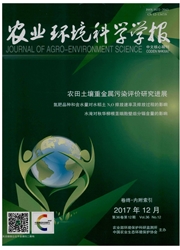

 中文摘要:
中文摘要:
通过富集培养法分离到的农药降解菌株存在稳定性差、底物谱窄、安全性不明等问题.Pseudomonas putida KT2440分离自根际土壤,是国际上公认的环境安全型菌株.利用同源重组方法将4种农药降解酶基因pytH、mpd、chd和amy A同时整合到P.putida KT2440的染色体上,获得了一株无抗性基因残留的工程菌P.putida KT-pmca.工程菌KTpmca能够同时降解拟除虫菊酯类杀虫剂、有机磷类杀虫剂、百菌清和氯代酰胺类4种农药,百菌清降解率大于95%,甲氰菊酯、毒死蜱和敌稗的降解率均达到80%以上.此外,传代实验证明4种降解酶基因能够在遗传中稳定存在.本研究表明工程菌KT-pmca可为微生物原位修复消除农药污染提供新的菌株资源.
 英文摘要:
英文摘要:
Microbial in situ remediation is considered as a promising method to eliminate the pollution of pesticides. Generally, pesticide-degrading microorganisms are isolated from pesticide-contaminated sites and are then employed to remediate the pollution of pesticides. The shortcomings of these strains are narrow substrate spectrum, unstable biodegrading ability and unknown safety. Pseudomonas putida strain KT2440 is isolated from rhizosphere soil and is generally recognized as safe. This study aimed to construct a multifunctional pesticide-degrading microorganism using P. putida strain KT2440 as the host, with a hope of making a promising candidate for in situ bioremediation. Pesticide-degrading enzyme encoding genes pytH, mpd, chd and ampA were integrated into the chromosome of P. putida strain KT2440 via homologous recombination. The recombinant strain KT-pmca could degrade four pesticides including pyrethroids, organophosphorus, chlorothalonil and amide. Among them, the degradation rate of chlorothalonil was more than 95% and the degradation rate of chlorpyrifos, fenpropathrin and stare exceeded 80%. Furthermore, pesticide-degrading phenotype of P. putida strain KT-pmca was quite stable. This study showed that the recombinant strain KT-pmca could provide a promising strain for the in situ remediation of pesticides contamination.
 同期刊论文项目
同期刊论文项目
 同项目期刊论文
同项目期刊论文
 期刊信息
期刊信息
